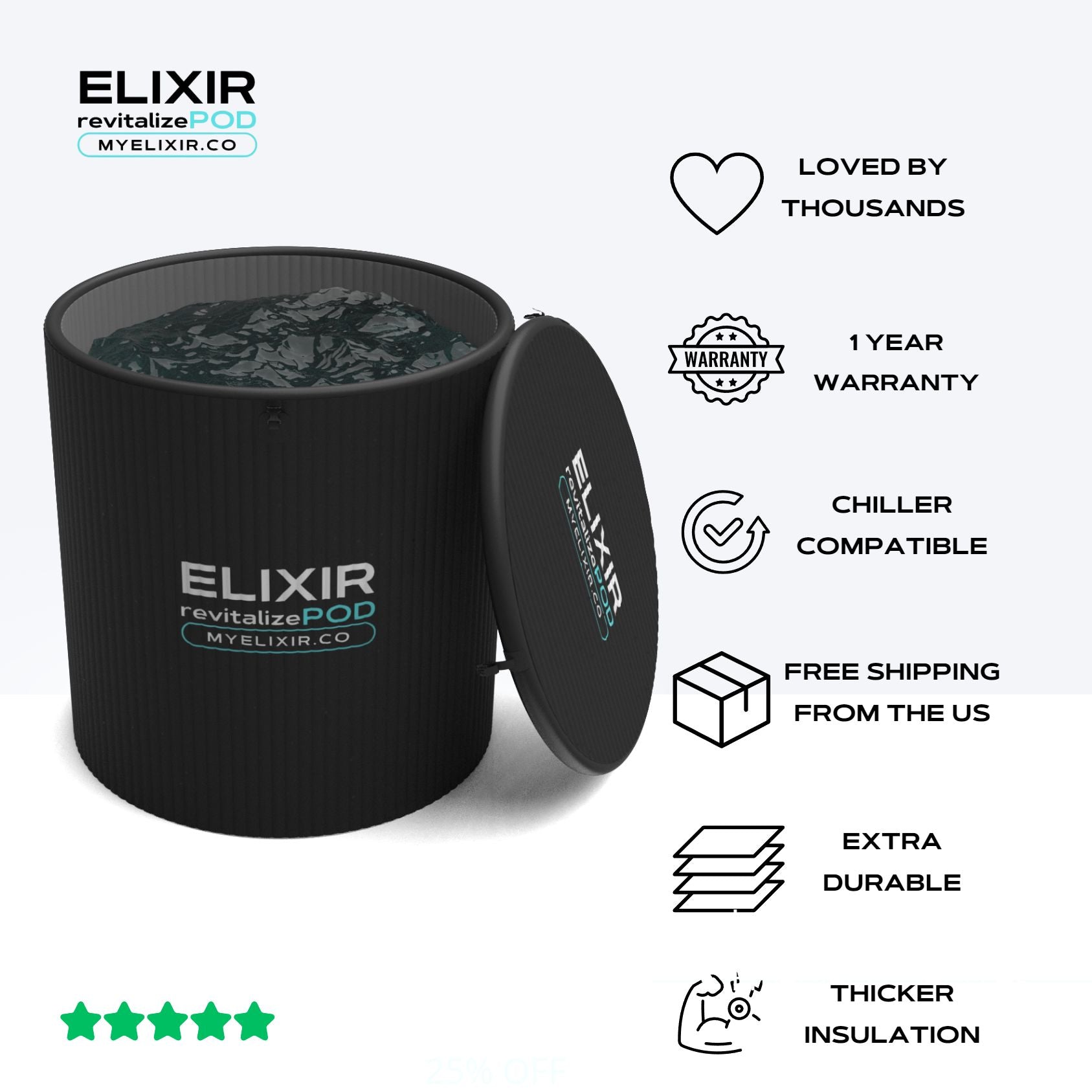Unlocking the Mental Health Benefits of Cold Water Therapy: A Deep Dive Into Wellness
In a world where stress and anxiety seem to have become part of daily life, finding ways to nurture mental well-being has never been more essential. Enter cold water therapy—a simple yet powerful practice that is making waves for its transformative mental health benefits.
Whether it’s taking a dip in a cold plunge pool, embracing an ice bath, or integrating cold showers into your routine, cold water therapy can offer more than just physical recovery. It’s also a game-changer when it comes to boosting mental clarity, reducing stress, and enhancing emotional resilience.
So, what is it about cold water that makes it so effective for mental wellness? In this blog, we’ll explore the remarkable mental health benefits of cold water therapy, and how incorporating it into your life can help combat stress, anxiety, and more.
What is Cold Water Therapy?
Cold water therapy, often referred to as cold immersion or cryotherapy, is the practice of exposing your body to cold water for short periods. While it may seem like an extreme wellness trend, cold water therapy has a rich history, with roots in ancient civilizations. Today, it’s more accessible than ever, thanks to portable ice baths, cold plunge pools, and even simple cold showers.
The process works by immersing your body in water that typically ranges from 50-59 degrees Fahrenheit (10-15 degrees Celsius). As cold water envelops your body, it triggers a variety of physiological and psychological responses that can dramatically impact your mental state.
The Mental Health Benefits of Cold Water Therapy
The idea of voluntarily plunging into icy water may sound daunting at first, but the mental health benefits are worth it. From lowering stress to improving focus, let’s break down how cold water therapy can boost your emotional well-being.
- Reducing Stress and Anxiety
One of the most notable benefits of cold water therapy is its ability to reduce stress and anxiety. When you immerse yourself in cold water, your body’s parasympathetic nervous system is activated. This part of the nervous system is responsible for helping your body rest and recover, promoting a sense of calm and relaxation.
Cold water therapy also stimulates the release of endorphins, which are natural mood elevators. Endorphins are often referred to as “happy hormones,” and they can help alleviate feelings of anxiety and promote an overall sense of well-being. Additionally, regular exposure to cold water can help lower levels of cortisol—the stress hormone that wreaks havoc on our mental and physical health.
How It Works:
- The initial shock of cold water triggers deep, controlled breathing, which calms the mind.
- Endorphins flood the brain, reducing feelings of stress and anxiety.
- Consistent cold exposure trains your body to better manage daily stressors.
- Enhancing Mental Focus and Clarity
We live in a world full of distractions, and staying focused is harder than ever. Cold water therapy has been shown to improve mental clarity and concentration. By triggering the release of norepinephrine, a hormone and neurotransmitter that plays a crucial role in attention and focus, cold water therapy helps sharpen your mental acuity.
When you plunge into cold water, your body shifts into survival mode, forcing your mind to focus on the present moment. This mental clarity can translate into improved focus long after you’ve dried off from your ice bath.
How It Works:
- Norepinephrine is released, increasing alertness and cognitive function.
- The mental discipline required to withstand cold exposure strengthens mental resilience.
- Regular cold water therapy can create lasting improvements in your ability to focus.
- Building Mental Resilience
Mental toughness is something we can all use more of, especially in the face of life’s challenges. Cold water therapy can help build this resilience by training your mind to withstand uncomfortable situations. Each time you immerse yourself in cold water, you push your mental limits, learning how to remain calm and composed in the face of discomfort.
This ability to endure physical stress translates into improved mental resilience, making it easier to navigate stressful situations in daily life. Whether it’s work deadlines, family pressures, or personal challenges, cold water therapy can give you the mental edge needed to stay calm under pressure.
How It Works:
- Exposure to cold water activates the body’s “fight or flight” response.
- Over time, your mind learns to manage this response, helping you stay composed in stressful situations.
- The practice strengthens mental fortitude, making you more adaptable to everyday challenges.
- Improving Mood and Emotional Balance
The link between cold water therapy and improved mood is undeniable. As mentioned earlier, cold immersion triggers the release of endorphins, which are natural pain relievers and mood enhancers. But there’s more to the story—cold water therapy also stimulates the production of dopamine and serotonin, two neurotransmitters that play key roles in mood regulation.
Dopamine, often called the “feel-good” hormone, is associated with feelings of pleasure and reward, while serotonin helps regulate mood, anxiety, and happiness. By boosting levels of these neurotransmitters, cold water therapy can have a lasting positive impact on your mood and emotional balance.
How It Works:
- Endorphins and dopamine are released, creating feelings of happiness and euphoria.
- Serotonin levels rise, helping to stabilize mood and reduce anxiety.
- Consistent cold exposure can lead to a more positive outlook and emotional stability.
- Combating Depression
For those struggling with depression, cold water therapy may offer some relief. While it’s not a substitute for professional treatment, the mental health benefits of cold immersion can complement other therapies and help alleviate symptoms of depression.
Cold water therapy can increase levels of norepinephrine, which is often deficient in people suffering from depression. By boosting this neurotransmitter, cold immersion may help improve mood, energy levels, and overall mental well-being.
Moreover, the sense of accomplishment that comes from completing a challenging ice bath or cold plunge can foster a positive mindset and boost self-esteem. As you build mental toughness through cold exposure, you may find it easier to break free from the negative thought patterns often associated with depression.
How It Works:
- Norepinephrine levels rise, helping to improve mood and combat feelings of depression.
- Cold water therapy creates a sense of accomplishment, boosting self-confidence and positivity.
- The combination of physical and mental benefits provides a natural boost to overall well-being.
How to Incorporate Cold Water Therapy into Your Routine
If you’re ready to experience the mental health benefits of cold water therapy, it’s easier than you might think to get started. Whether you have access to a cold plunge pool, a portable ice bath, or even just a cold shower, here are some tips for incorporating cold water therapy into your life. It is very simple to add cold water chillers to the products.
- Start with Cold Showers
Not everyone has access to an ice bath or cold plunge pool, but anyone can start with cold showers. Begin by turning the water to cold for the last 30 seconds of your shower, and gradually increase the duration over time.
- Try a Portable Ice Bath
If you’re ready to take your cold water therapy to the next level, consider investing in a portable ice bath. These are designed for easy use and can be set up in your home or backyard. A portable ice bath offers the full benefits of cold immersion without requiring a dedicated plunge pool or large space. Portable Water chillers can be connected for even colder temperatures. By adding an ice chiller it helps maintain a steady flow.
- Focus on Breathing
One of the key aspects of cold water therapy is learning to control your breath. The initial shock of cold water will make you want to gasp, but focusing on slow, deep breathing will help calm your mind and body.
- Consistency is Key
To fully experience the mental health benefits of cold water therapy, consistency is important. Aim to incorporate cold exposure into your routine a few times a week to see the best results.
Final Thoughts: The Transformative Power of Cold Water Therapy for Mental Wellness
Cold water therapy isn’t just a physical wellness trend—it’s a powerful tool for boosting mental health. From reducing stress and anxiety to improving focus, building mental resilience, and combating depression, the mental health benefits of cold immersion are both profound and wide-ranging.
Whether you start with cold showers or dive straight into an ice bath, cold water therapy can become a cornerstone of your mental wellness routine. So, take the plunge—your mind and body will thank you for it.



